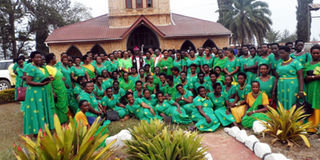Ankole diocese women start Sacco to improve livelihoods

Launch. Members of Ankole Diocese Women Investment Association (ADWI) pose with the diocese Bishop Sheldon Mwesigwa (circled) during the association launch at Ankole Diocese headquarters in Ruharo, Mbarara Town in 2018. PHOTO BY RAJAB MUKOMBOZI
What you need to know:
- Every member pays Shs1,000 per week (Shs4,000 a month) and the association is targeting to enlist at least 100 women from each of the 600 churches in the diocese, meaning they target membership of 60,000 women.
- Each church saves Shs400,000 per month, which translates into Shs240m every month for all the 600 churches in the diocese. This translates into about Shs2.8b a year or Shs34.5b in five years.
Mbarara. Many women in rural areas look up to their husbands for all household needs. This creates a lot of pressure on men, sometimes resulting into domestic violence and other conflicts in home.
To bring back compassion and harmony in homes, Dr Alice Mwesigwa, wife of Ankole Diocese Bishop Sheldon Mwesigwa has started a programme to empower women to be able to make financial contributions towards the well-being of their families.
Through Ankole Diocese Women Investment Association (ADWIA), Dr Mwesigwa is teaching women how to save and successfully run income-generating projects.
She is rallying women in the diocese to contribute Shs1,000 weekly that will be left to accumulate for a period of five years, and thereafter be invested in various projects and interventions for economic and social well-being of women.
Over the next five years, ADWIA expects to have accumulated savings of at least Shs35 billion from at least 60,000 members across Mbarara and Isingiro districts, if the current saving plan works out as planned.
Already, Shs50 million has been collected from more than 4,500 members since the association started in September 2015.
Dr Mwesigwa says through interaction with women in the diocese, she has learnt that they have a poor saving culture, which is responsible for their economic vulnerability.
“One of the objectives is to see how we can educate women how to save and positively contribute to development of families,” says Dr Mwesigwa.
She also said in the church’s analysis of domestic violence, it was found out that poverty was one of the major causes.
“We found out that domestic violence was high because of sole dependence on a man, yet he cannot manage to provide everything. We had to find out how we could empower women to support their husbands. If he can pay for school fees, let the woman buy books and uniform,” Dr Mwesigwa explains.
The members will benefit in terms of borrowing money from the association, health insurance and educating their children.
Challenges
However, they have challenges that slow down the pace.
Dr Mwesigwa says there is lack of trust from community because some people have been defrauded before by associations and saving groups.
“But the good chance is that these people are pulled by the credibility of people behind it and its alignment to the church,” says Dr Mwesigwa.
Some men also fear that their wives’ economic empowerment might be an attack on their status and privileges.
This fear at times makes some men become rigid to allow their wives freely join empowerment groups and associations.
Commenting about the association, Bishop Mwesigwa says it is making a significant change not only in women’s lives, their families but also communities where they live.
“Most of our people are used to working for daily bread. The concept of saving for the future is very foreign to our people, and so what this association is doing is better for generations. They discovered the advantage of numerical strength, unity and togetherness for social-economic transformation,” Bishop Mwesigwa says.
Beneficiaries speak out
Ms Peace Tumwesigye, 45, a resident of Nyaruhandagazi, Bugamba Sub-county and a member of the association, says: “Since joining ADWIA two years back, I have learnt and discovered that domestic violence and family instabilities are because of stress, especially that the family puts on a family head (man) to solely provide for them.”
Ms Ephrance Kamondo, 66, a resident of Ruhaaro, Mbarara Town and one of the pioneer members of ADWIA, says the association has made her realise that united, women can be a strong force in social-economic transformation.
Ms Cathy Musiime 38, of Nyarubanga, Kashari Mbarara, says ADWIA has helped her improve her saving culture.




